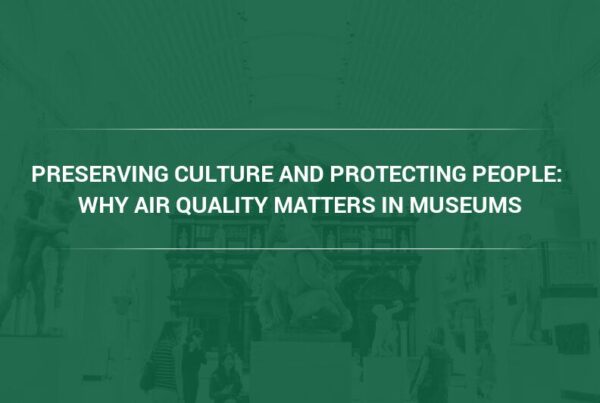The 2023 Allergy Capitals Report has ranked seven Florida cities among the top 20 worst allergy seasons across the nation. These seven cities are Sarasota, Cape Coral, Orlando, Miami, Lakeland, Palm Bay, and Tampa. To determine the highly populated cities most impacted by allergy season each year, the report assessed several factors including pollen count, usage of over-the-counter medications, and accessibility of allergists and immunologists.
As a popular summer travel destination, high summer pollen levels in Florida impact millions of Americans yearly. Continue reading to learn more about allergy season in each of these Florida cities, as well as providing tips for a better Florida allergy season guided by air quality industry expertise.
What Are the Symptoms of Seasonal Allergies?
Seasonal allergies, also known as hay fever or “seasonal allergic rhinitis,” result from a reaction to airborne allergens like pollen or mold. These allergens are released during certain times of the year, depending on the plant and region. Therefore, the time of year that an individual person experiences allergy symptoms may vary depending on what specific kinds of pollen they are allergic to.
Symptoms of seasonal allergies can include:
- Sneezing
- Stuffy nose
- Runny nose
- Red, itchy, or watery eyes
- Itchy ears, nose, and mouth
- Throat pain and irritation
- Fatigue or excessive tiredness
Seasonal allergies affect people differently. While some only experience mild discomfort, others can suffer from more severe symptoms that disrupt their lives. This can lead to using sick leave or paid time off for adults or missing school for children, as allergy sufferers try to manage their symptoms and avoid exposure to pollen.
Due to the state’s warm, rainy climate and mild winters, flora thrives year-round in Florida, leading to an unpleasant year-round pollen season for allergy sufferers as different plants pollinate. However, allergens tend to peak in April and May and then again in September, making those months especially difficult.
What is Allergy Capitals Report?
The Asthma and Allergy Foundation of America publishes its “Allergy Capitals” report annually, which scores the 100 most populous U.S. cities based on allergen levels such as pollen.
Seasonal allergies result from an overactive immune system responding to airborne particles like pollen, mold spores, and dust mites. Symptoms include sneezing, runny nose, itchy eyes and coughing, and sometimes more severe reactions like swollen throat or hives on the body.
The Allergy Capitals report ranks cities based on tree, weed, and grass pollen counts, over-the-counter medication sales, and the availability of allergy specialists in the area.
Sarasota 2023 Allergy Season (Overall Rank: #6)
Ranking sixth out of the one hundred cities on the Allergy Capitals report, Sarasota’s allergy season has gotten dramatically worst compared to the previous year when it ranked at 42nd on the 2022 Allergy Capitals report.
Below are Sarasota’s rankings on the list of 100 cities for total pollen count by plant type:
- Tree pollen: 3
- Grass pollen: 9
- Weed pollen: 16
Severe allergens in Sarasota include Carolina willow, live oak, red mulberry, Eastern poison ivy, ragweed, silverling, spiny amaranth, Bermuda grass, corn, and perennial ryegrass.
Cape Coral 2023 Allergy Season (Overall Rank: #7)
Cape Coral also made the top ten, ranking at number seven. The effects of Hurricane Ian on Cape Coral’s air quality may also increase the severity of symptoms for allergy sufferers.
Below are Cape Coral’s rankings on the list of 100 cities for total pollen count by plant type:
- Tree pollen: 5
- Grass pollen: 18
- Weed pollen: 33
Severe allergens in Cape Coral include Carolina ash, laurel oak, live oak, red mulberry, white mulberry, smooth amaranth, ragweed, Bermuda grass, corn, and perennial ryegrass.
Orlando 2023 Allergy Season (Overall Rank: #8)
At number eight, Orlando’s allergy season is also significantly worse this year than last year when it ranked 41st. Grass pollen levels peak April through July and are immediately followed by the peak of weed pollen season, which usually occurs August through October.
Below are Orlando’s rankings on the list of 100 cities for total pollen count by plant type:
- Tree pollen: 13
- Grass pollen: 8
- Weed pollen: 5
Severe allergens in Orlando include Carolina willow, groundsel tree, Eastern red cedar, red mulberry, Florida pellitory, saltwater false willow, Pacific wormwood, Bermuda grass, and winterbent.
Miami 2023 Allergy Season (Overall Rank: #14)
With a wide variety of different kinds of trees in large numbers and an allergy season that peaks in spring and summer, Miami is ranked 14th.
Below are Miami’s rankings on the list of 100 cities for total pollen count by plant type:
- Tree pollen: 9
- Grass pollen: 33
- Weed pollen: 65
Severe allergens in Miami include Chapman’s oak, Carolina willow, paper mulberry myrtle oak, scrub hickory, old woman, saltwater false willow, seacoast marsh elder, Bermuda grass, and common timothy.
Lakeland 2023 Allergy Season (Overall Rank: #15)
With moderate pollen counts and over-the-counter medication usage but low availability of local allergen specialists, Lakeland ranks 15th in the Allergy Capitals report.
Below are Lakeland’s rankings on the list of 100 cities for total pollen count by plant type:
- Tree pollen: 19
- Grass pollen: 20
- Weed pollen: 24
Severe allergens in Lakeland include glossy privet, groundsel tree, paper mulberry, Carolina willow, Eastern poison ivy, pignut hickory, Southern red oak, annual ragweed, Florida pellitory, small-head marsh elder, smooth amaranth, Bermuda grass, and corn.
Palm Bay 2023 Allergy Season (Overall Rank: #17)
Palm Bay ranked 17th, marking a significant increase in severity from 2022’s ranking of 46th.
Below are Palm Bay’s rankings on the list of 100 cities for total pollen count by plant type:
- Tree pollen: 26
- Grass pollen: 32
- Weed pollen: 13
Severe allergens in Palm Bay include bluejack oak, box elder, green ash, Turkey oak, water oak, Carolina ash, Jesuit’s bark, coastal ragweed, Russian thistle, spiny amaranth, bermudagrass, and corn.
Tampa 2023 Allergy Season (Overall Rank: #18)
Ranking #18 in the 2023 Allergy Capitals report, Tampa’s allergy seasons have been steadily increasing in severity and growing in length over the last several years.
Below are Tampa’s rankings on the list of 100 cities for total pollen count by plant type:
- Tree pollen: 22
- Grass pollen: 21
- Weed pollen: 41
Severe allergens in Tampa include water oak, paper mulberry, live oak, Eastern red cedar, Florida pellitory, Jesuit’s bark, silverling, bermudagrass, and perennial ryegrass.
8 Tips for Minimizing Allergy Symptoms in Florida
While it’s challenging for allergy sufferers to avoid pollen and eliminate hay fever symptoms entirely, the following tips can help to minimize them in spring:
- Check local pollen counts regularly.
- Plan yard work around pollen spikes.
- Change and wash your clothes after extended periods of time outdoors.
- Bathe or shower after coming in from outdoors.
- Keep doors and windows closed.
- Vacuum often.
- Use a nasal rise to move allergens out of your nasal passages.
- Protect your home with HEPA filters.
Premium Air Filters Can Alleviate Florida Pollen Allergy Symptoms
Allergies can force many people to stay indoors to avoid pollen outside. But while this is good advice for those with severe allergies, it may not be as effective as you’d think.
Indoor air pollution is a major concern, with pollen being one of the biggest culprits. Pollutants in enclosed areas can be up to 50 times more concentrated, especially in poorly ventilated spaces. The lack of fresh airflow causes harmful particles to accumulate and circulate, putting people at risk.
Ideal for use in homes, offices, classrooms, gyms, and commercial and public buildings, air purifiers with factory-tested HEPA filters are the best air filtration solution for seasonal allergies. Because they plug into standard electrical outlets and work independently of the building’s HVAC system, air purifiers are easy to install and can be moved to different locations in the building as needed.
Camfil’s City M air purifier utilizes superior tested and certified HEPA filters to mitigate indoor pollen concentrations, reducing allergy symptoms. It also incorporates an activated carbon filter to capture and diminish irritants like household odors, fumes, and VOCs, preventing respiratory irritation.
By installing an efficient air purifier such as the City M, taking medication, and undergoing immunotherapy if deemed necessary by your doctor, you can manage your allergies this season and enjoy a more comfortable Florida summer.
About Camfil Clean Air Solutions
For more than half a century, Camfil has been helping people breathe cleaner air. As a leading manufacturer of premium clean air solutions, we provide commercial and industrial systems for air filtration and air pollution control that improve worker and equipment productivity, minimize energy use, and benefit human health and the environment. We firmly believe that the best solutions for our customers are the best solutions for our planet, too. That’s why every step of the way – from design to delivery and across the product life cycle – we consider the impact of what we do on people and on the world around us. Through a fresh approach to problem-solving, innovative design, precise process control, and a strong customer focus we aim to conserve more, use less and find better ways – so we can all breathe easier.
The Camfil Group is headquartered in Stockholm, Sweden, and has 30 manufacturing sites, six R&D centers, local sales offices in 35+ countries, and about 5,600 employees and growing. We proudly serve and support customers in a wide variety of industries and in communities across the world. To discover how Camfil USA can help you to protect people, processes and the environment, visit us at www.camfil.us/
##
Media Contact:
Lynne Laake
Camfil USA Air Filters
T: 888.599.6620
E: Lynne.Laake@camfil.com
F: Friend Camfil USA on Facebook
T: Follow Camfil USA on Twitter
Y: Watch Camfil Videos on YouTube
L: Follow our LinkedIn Page
Sources:



